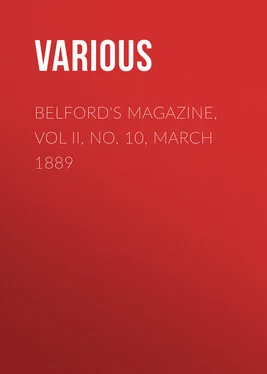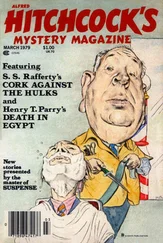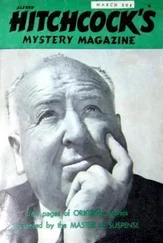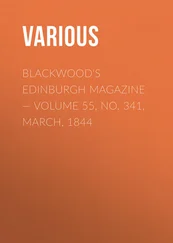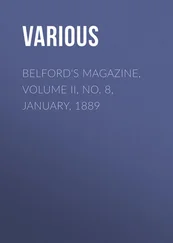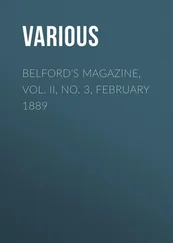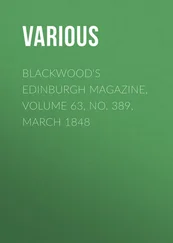Various - Belford's Magazine, Vol II, No. 10, March 1889
Здесь есть возможность читать онлайн «Various - Belford's Magazine, Vol II, No. 10, March 1889» — ознакомительный отрывок электронной книги совершенно бесплатно, а после прочтения отрывка купить полную версию. В некоторых случаях можно слушать аудио, скачать через торрент в формате fb2 и присутствует краткое содержание. Издательство: Иностранный паблик, Жанр: periodic, foreign_edu, на английском языке. Описание произведения, (предисловие) а так же отзывы посетителей доступны на портале библиотеки ЛибКат.
- Название:Belford's Magazine, Vol II, No. 10, March 1889
- Автор:
- Издательство:Иностранный паблик
- Жанр:
- Год:неизвестен
- ISBN:нет данных
- Рейтинг книги:5 / 5. Голосов: 1
-
Избранное:Добавить в избранное
- Отзывы:
-
Ваша оценка:
- 100
- 1
- 2
- 3
- 4
- 5
Belford's Magazine, Vol II, No. 10, March 1889: краткое содержание, описание и аннотация
Предлагаем к чтению аннотацию, описание, краткое содержание или предисловие (зависит от того, что написал сам автор книги «Belford's Magazine, Vol II, No. 10, March 1889»). Если вы не нашли необходимую информацию о книге — напишите в комментариях, мы постараемся отыскать её.
Belford's Magazine, Vol II, No. 10, March 1889 — читать онлайн ознакомительный отрывок
Ниже представлен текст книги, разбитый по страницам. Система сохранения места последней прочитанной страницы, позволяет с удобством читать онлайн бесплатно книгу «Belford's Magazine, Vol II, No. 10, March 1889», без необходимости каждый раз заново искать на чём Вы остановились. Поставьте закладку, и сможете в любой момент перейти на страницу, на которой закончили чтение.
Интервал:
Закладка:
And so in some indirect way I have answered your question; and I would like to add that I foresee that the dominion of the novel must be extended. Fiction is now followed by appalling numbers with amazing fecundity and marvellous skill, which, though mainly imitative, is occasionally original; but its channels are few and very narrow. Already the world seems to be growing weary of feeble copies of feeble men and feeble manners. It wants more grit, more aim, more thought, and more imagination. But this is thin ice to tread, and I would not disparage by a word or a wink the few novelists now living who will assuredly rank with the best in literature. Dugald Stewart said that human invention, like the barrel organ, was limited to a specific number of tunes. The present hurdy-gurdy business has been going on a longish time. We are threatened with the Minerva press over again, and the class of readers who see no difference between Walter Scott and John Galt. But, free of the prudery of the tabernacle and the prurience of the boulevard, surely the novel has a great future before it. Its possibilities seem to me nearly illimitable. Though the best of the novel is nowhere a match for the best of the drama, yet I verily believe that if all English fiction, from Defoe downwards, including names conspicuous and inconspicuous, remembered and forgotten, were matched against all English poetry of whatever kind, from Pope to our own day, it would be found that the English novelist is far ahead of the English poet in every great quality – imagination, pathos, humor, largeness of conception, and general intellect. And I will not hesitate to go further and say that, the art of the novel is immeasurably greater than the art of the drama itself – more natural as a vehicle and less limited in its uses, more various in subject and less trammelled in its mechanism, capable of everything that the drama (short of the stage) can do, and of infinitely more resource.
Hall Caine.After pleading illness and arrears of literary work and correspondence in excuse of the brevity of his note, Mr. Collins says:
Besides, the expression of my opinion in regard to writers of fiction and their works will lose nothing by being briefly stated. After more than thirty years' study of the art, I consider Walter Scott to be the greatest of all novelists, and "The Antiquary" is, as I think, the most perfect of all novels.
Wilkie Collins.Dear Sir: I think that my favorite novel is Dickens's "Tale of Two Cities." I will not trouble you with all my reasons for this preference. I may say, however, and I do so with humility, and merely as an individual expression of opinion, that it seems to me that in this great book Dickens touched his highest level. Of course, the greatness of the subject has something to do with the effect produced upon the mind, but in my view there is a dignity and an earnestness in the work which lift it above the rest. Also I think it one of the most enthralling stories in the language.
H. Rider Haggard.Dear Sir: You ask me to name my favorite novel, and if it should happen to be a work by a foreign author to mention my favorite English work of fiction also. I find it impossible to answer you. When I was a boy "The Last of the Mohicans" was my favorite novel; a young man and in love, "David Copperfield" became my favorite. When I grew to be a man "The Scarlet Letter" took the place of David and the North American Indian; but ever since I can remember I have always been reading "Monte Cristo" with unflagging delight. One's favorite book is a question of mood. Now and then one might be inclined to regard "Adam Bede" as the most companionable of fiction; there are other times when "Pickwick" appeals most to one's fancy, or when one is even in the humor for "L'Homme qui Rit." "Don Quixote" fits all moods, and there are moments when a page or two of "Clarissa" are to one's taste. But with Scott, Dickens, Thackeray, Hugo, Dumas, George Eliot, Hawthorne, Smollett, Balzac, Erckmann-Chatrian, Lytton, Lever, Ik Marvel, George Sand, Charles Reade, Turgeneff, and a host of other famous writers of fiction staring me in the face, don't ask me to say which of their works is my favorite novel.
Joseph Hatton.Dear Sir: I hasten to acknowledge your letter. I do not think, however, that I can answer in a satisfactory manner. I am very little of a novel reader, and do not feel that my opinion on the subject of novels is therefore of critical value. Of the few novels I know (comparing my reading with that of the average Englishman or woman) I naturally prefer some; but to give you the titles of them – I think I should place first Tolstoï's "War and Peace" and Stendhal's "Chartreuse de Parme" – would not be giving your readers any valuable information, as I could not find leisure to explain why I prefer them.
"Vernon Lee."Sir: Waiving the difficulty, if not the impossibility, of a complete and satisfactory answer to your question, I will come at once to the point. You ask me to name my favorite work of fiction, giving reasons for the preference. The interest of such a question will be found in the amount of naïve sincerity with which it is answered. I will therefore strive to be as naïvely sincere as possible.
Works of romance I must pass over, not because there are none that I appreciate and enjoy, but because I feel that my opinion of them would not be considered as interesting as my opinion of a work depicting life within the limits of practical life. The names of many works answering to this description occur to me, but in spirit and form they are too closely and intimately allied to my own work to allow me to select any one of them as my favorite novel. Looking away from them my thought fixes itself at once on Miss Austen. It therefore only remains for me to choose that one which appears to me to be the most characteristic of that lady's novels. Unhesitatingly I say "Emma."
The first words of praise I have for this matchless book is the oneness of the result desired and the result attained. Nature in producing a rose does not seem to work more perfectly and securely than Miss Austen did. This merit, and this merit I do not think any one will question, eternalizes the book. "L'Education Sentimentale," "The Mill on the Floss," "Vanity Fair," "Bleak House," I admire as much as any one; but I can tell how the work is done; I can trace every trick of workmanship. But analyse "Emma" as I will, I cannot tell how the perfect, the incomparable result is achieved. There is no story, there are no characters, there is no philosophy, there is nothing: and yet it is a chef-d'œuvre . I have said there are no characters; this demands a word of explanation. Miss Austen attempts only – and thereby she holds her unique position – the conventionalities of life. She presents to us man in his drawing-room skin: of the serpent that gnaws his vitals she cares nothing, and apparently knows nothing. The drawing-room skin is her sole aim. She never wavers. The slightest hesitation would be fatal; her system is built on a needle's point. We know that no such mild, virtuous people as her's ever existed or could exist; the picture is incomplete, but there lies the charm. The veil is wonderfully woven, figures move beneath it never fully revealed, and we derive pleasure from contemplating it because we recognize that it is the sham hypocritical veil that we see but feel not – the sham hypocritical world that we see is presented to us in all its gloss without a scratch on its admirable veneer. No writer except Jane Austen ever had the courage to so limit himself or herself. The strength and the weakness of art lies in its incompleteness, and no art was ever at once so complete and incomplete as Miss Austen's.
Читать дальшеИнтервал:
Закладка:
Похожие книги на «Belford's Magazine, Vol II, No. 10, March 1889»
Представляем Вашему вниманию похожие книги на «Belford's Magazine, Vol II, No. 10, March 1889» списком для выбора. Мы отобрали схожую по названию и смыслу литературу в надежде предоставить читателям больше вариантов отыскать новые, интересные, ещё непрочитанные произведения.
Обсуждение, отзывы о книге «Belford's Magazine, Vol II, No. 10, March 1889» и просто собственные мнения читателей. Оставьте ваши комментарии, напишите, что Вы думаете о произведении, его смысле или главных героях. Укажите что конкретно понравилось, а что нет, и почему Вы так считаете.
